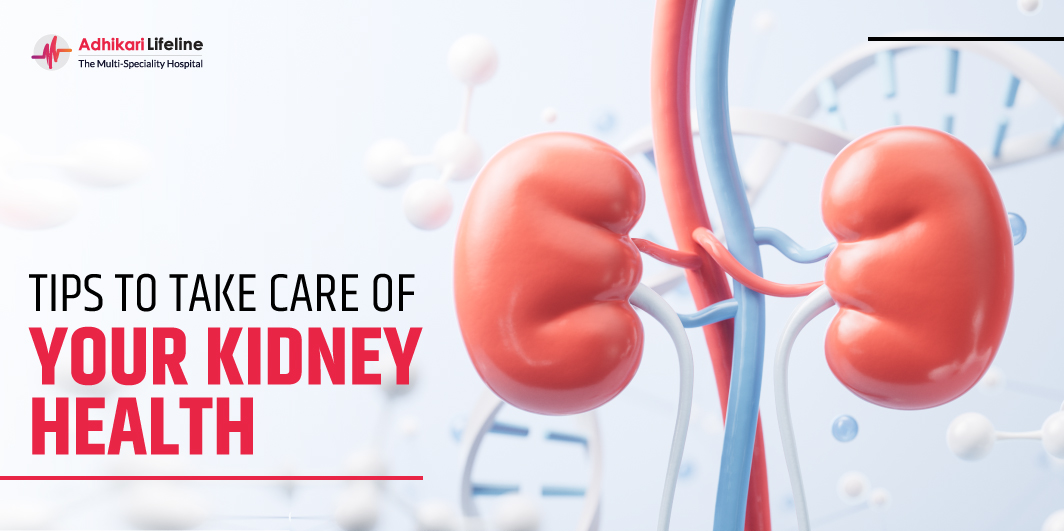April 1, 2024 By Adhikari Lifeline No comments yet
Your kidneys are vital organs that perform many important functions like filtering waste and extra fluid from your blood. Maintaining kidney health is important for overall well-being.
Basically, kidneys are two bean-shaped organs located near the middle of your back, below the rib cage. Each kidney is about the size of a fist. The kidneys filter about 50-125 ml of blood every minute, removing waste and extra water to produce urine. In addition to removing waste, kidneys also help regulate blood pressure, make erythropoietin (a hormone that tells the bone marrow to make red blood cells), activate vitamin D for bone health and produce an enzyme that helps regulate blood pressure.
When the kidneys are unable to effectively perform their functions, it can lead to a build up of toxins in the blood which can damage other organs. This is why maintaining kidney health is so important for overall well-being. At Adhikari Lifeline Hospital, we have expert Nephrologists and Dialysis Centre in Boisar for the effective management of kidney health. We understand that there are many doubts when it comes to taking care of the kidneys. Let’s clear the doubts, here are some important signs of kidney damage and tips to take care of your overall kidney health!
Signs of Kidney Damage
Some signs that could indicate potential kidney damage include:
– Foamy, dark or bloody urine
– Swollen feet or ankle
– Fatigue, lack of energy
– Increased urine output at night
– Loss of appetite
– Itchy skin
– Nausea, vomiting
– Shortness of breath
– Confusion
Tips To Care For Kidneys
Maintain an Active Lifestyle
Regular physical activity is beneficial for kidney health. Exercise can help control weight and reduce risk of conditions like hypertension and diabetes that can damage kidneys. It has been seen that being physically active for at least 30 minutes a day lowers risk of chronic kidney disease. Even simple activities like walking, cycling or swimming can benefit kidneys.
Manage Medical Conditions
Medical conditions like hypertension and diabetes are major risks for kidney disease as they can cause damage over time. Nephrologists in Boisar recommend managing such conditions through a balanced diet, weight control, medication and regular monitoring of blood pressure and blood sugar levels. This can significantly reduce chances of kidney damage.
Control Weight
Being overweight increases risk of high blood pressure, diabetes and other conditions that can potentially harm kidneys. Losing extra pounds if overweight and maintaining a healthy weight helps protect kidneys.
Drink Adequate Water
Drinking enough fluids helps remove toxins from the body through urine and prevents waste buildup. The basic recommendation is to drink eight 8-ounce glasses or around 2 liters of water daily. More may be needed if exercising heavily or living in hot weather.
Limit Intake of Pain Relievers
Long term use of over-the-counter pain relievers like ibuprofen can potentially cause harm to kidneys, especially in people with prior kidney disease or risk factors. It is best to limit use as per doctor’s advice and instead opt for alternate pain management options.
Quit Smoking and Get Checkups if at Higher Risk
Smoking is harmful for overall health and also increases risk of kidney disease and kidney cancer. Quitting smoking can significantly reduce risks to kidneys. Those with medical issues like diabetes or hypertension, family history of kidney disease, old age (over 60) should get regular checkups from Kidney Specialists in Boisar. Screening blood and urine tests can detect early signs of kidney damage before symptoms appear, allowing timely treatment.
Treatment Options for Kidney Disease
For early or mildly damaged kidneys, lifestyle changes under doctor’s guidance may help slow progression. In advanced disease, dialysis (a filtering process to remove waste when kidneys fail) or kidney transplant may be required. Treatment depends on cause and severity. Early detection always helps prevent further deterioration. If there’s 100% kidney damage than patient may need to undergo Kidney Transplant.At Adhikari Lifeline Hospital, we have a state-of-the-art dialysis centre equipped to provide hemodialysis and peritoneal dialysis. Our expert team of Nephrologists in Boisar helps identify risk factors, monitor disease progression and determine the best treatment plan. Feel free to get in touch with us to evaluate your kidney health and manage it with timely medical intervention. Maintaining kidney health should be a top priority for overall wellness.

Leave A Comment